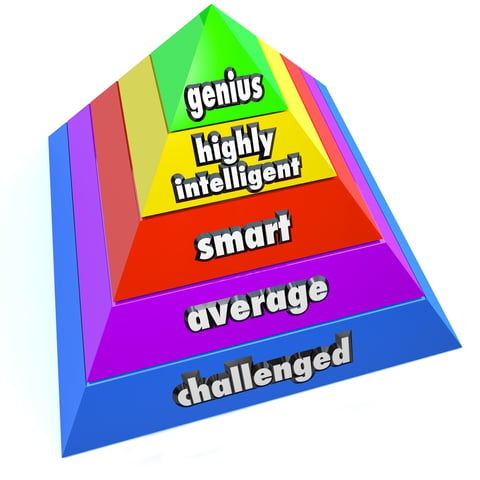 In 1904, the minister of public instruction in Paris asked the French psychologist Alfred Binet and a group of colleagues to develop a means of determining which primary grade students were “at risk” for failure so these students could receive remedial attention. Out of their efforts came the first intelligence tests. Imported to the United States several years later, intelligence testing became widespread, as did the notion that there was something called “intelligence” that could be objectively measured and reduced to a single number or “IQ” score.
In 1904, the minister of public instruction in Paris asked the French psychologist Alfred Binet and a group of colleagues to develop a means of determining which primary grade students were “at risk” for failure so these students could receive remedial attention. Out of their efforts came the first intelligence tests. Imported to the United States several years later, intelligence testing became widespread, as did the notion that there was something called “intelligence” that could be objectively measured and reduced to a single number or “IQ” score.
Intelligence has been an important and controversial topic throughout psychology’s history. Despite the substantial interest in the subject, there is still considerable disagreement about what exactly constitutes intelligence. In addition to questions of exactly how to define intelligence, the debate continues today about whether accurate measurements are even possible.
Intelligence is an encompassing term
Whether one agrees with the application of IQ tests or not, it is doubtful that there is such a thing as general intelligence. Intelligence is an encompassing term. Many people feel that intelligence includes such attributes as creativity, persistent curiosity, and success. Consider, for example, that James Watson, the discoverer of DNA, has an IQ of about 115 — about the IQ of most college students. He claims that his great success was due to his persistent curiosity, something not measured by IQ tests. IQ tests, however, are poor indicators of many attributes of this nature. Generally, IQ tests seem to measure common skills and abilities, most of which are acquired in school. Thus, in opposition to the idea of a general intelligence, the concept of “multiple intelligences” came into being.
Undoubtedly, the man who stands out from the crowd for formally introducing the idea of multiple intelligences was L.L. Thurstone (1887-1955). Thurstone was a mathematician who had been hired to work in Thomas Edison’s laboratory. Thurstone soon became aware that Edison seemed completely unable to comprehend mathematics. This led Thurstone to conclude that, rather than a single quality called general intelligence, there must be many kinds of intelligence, perhaps each unrelated to the other. Thurstone believed that if a person was intelligent in one area it didn’t necessarily mean that he would be intelligent in another.
Article continued below...
We Help Children Read. Learn. Achieve.
We offer fundamental solutions to learning barriers –
“It’s been six months … and already she is one of the top performers in her class”
I was told that my daughter would never make it in a mainstream school and that she had to be transferred to a remedial school... She is getting 6's and 7's and she is in mainstream school. Continue Reading
Zan’s Mom, South Africa Edublox Online Tutor December 21, 2013
.
Gardner’s multiple intelligences
Harvard Professor Howard Gardner suggests that there are at least eight different types of intelligence, which are
- Verbal-linguistic intelligence (“word smart”)
- Logical-mathematical intelligence (“number/reasoning smart”)
- Visual-spatial intelligence (“picture smart”)
- Musical intelligence (“music smart”)
- Bodily-kinaesthetic intelligence (“body smart”)
- Interpersonal intelligence (“people smart”)
- Intrapersonal intelligence (“self smart”)
- Naturalist intelligence (“nature smart”)
.
Gardner says that our schools and culture focus most of their attention on verbal-linguistic and logical-mathematical intelligence. We esteem the highly articulate or logical people of our culture. Gardner however says that we should place equal attention on individuals who show gifts in the other intelligences.
The theory of multiple intelligences proposes a major transformation in the way our schools are run. It suggests that teachers be trained to present their lessons in a wide variety of ways using music, cooperative learning, art activities, role play, multimedia, field trips, inner reflection, and much more.
.

